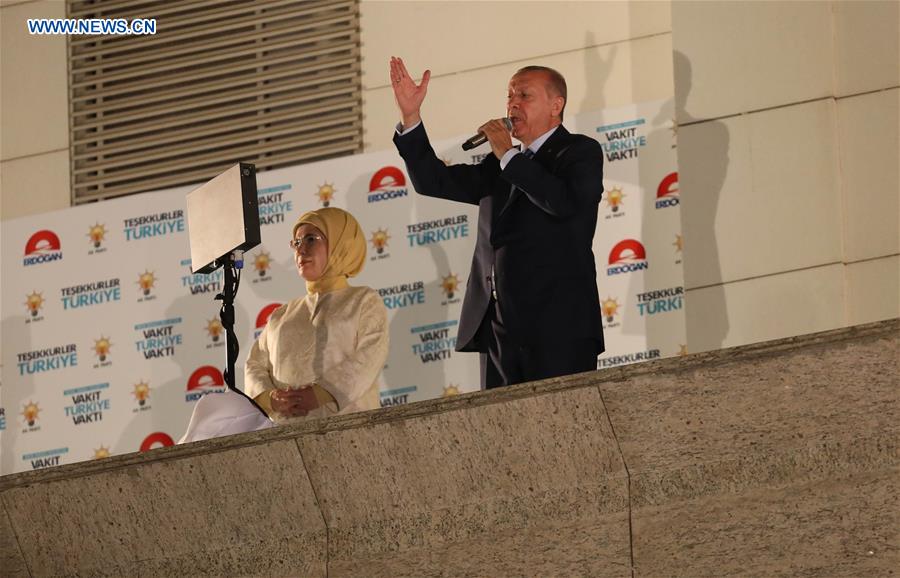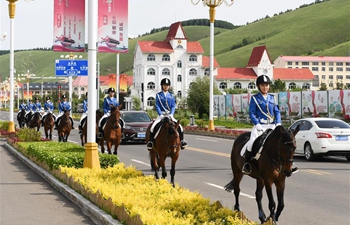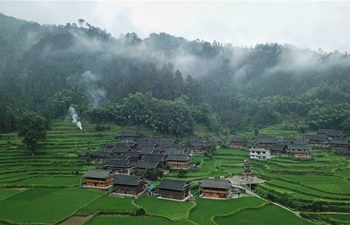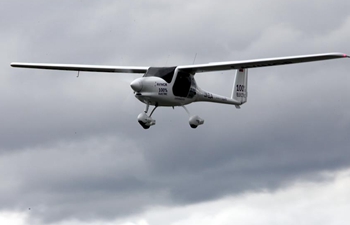
Turkish President Recep Tayyip Erdogan addresses his supporters with his wife on a rally in front of the Justice and Development Party (AKP) headquarters in Ankara, Turkey, on June 25, 2018. Turkey's long-standing leader Recep Tayyip Erdogan won reelection in crucial general elections on Sunday, which would grant him new executive powers amid increasing economic uncertainty. (Xinhua/Mustafa Kaya)
ANKARA, June 24 (Xinhua) -- Turkey's long-standing leader Recep Tayyip Erdogan won reelection in crucial general elections on Sunday, which would grant him new executive powers amid increasing economic uncertainty.
With 98 percent of the votes counted, the state-run Anadolu Agency announced the Turkish president obtained 52.5 percent of the votes while his main contender, Muharrem Ince, candidate of the main opposition Republican People's Party( CHP), received 30.7 percent.
Erdogan's victory of more than majority in the first round of polling made a run-off predicted by many surveys unnecessary.
Erdogan claimed victory in a speech delivered before media in Istanbul.
"According to unofficial results, the outcome of the elections are clear. The nation has entrusted me the role of president and executive power. We have also won the majority in parliament with our alliance partners," Erdogan said after the elections.
Thousands of Erdogan supporters took to the streets in big cities to celebrate his victory, waving Turkish national flags and chanting slogans.
The elections were seen as unprecedented in the nation of 81 million by producing a president who will wield sweeping executive powers enabled by a narrowly approved constitutional referendum last year.
The new system abolishes the post of prime minister and the president becomes the head of both state and government.
Erdogan, 64, has been ruling Turkey for 15 years as prime minister and current president.
In the Sunday elections, nearly 60 million Turkish people voted to elect a president and a 600-seat parliament.
Results with 98 percent of the votes counted showed Erdogan's ruling Justice and Development Party (AKP) garnered 42.4 percent of the votes and its ally the Nationalist Movement Party (MHP) obtained nearly 11.2 percent, when combined, enough to ensure a parliamentary majority.
The pro-Kurdish Peoples' Democratic Party (HDP) passed narrowly the 10 percent threshold to enter the parliament while its jailed candidate Selahattin Demirtas got around 8.3 percent of the votes in the presidential race.
"In good news, Turkey is getting its most diverse parliament in 35 years," commented political analyst Soner Cagaptay, noticing an 87 percent turnout in the elections.
"Turkish voters have proved great democratic maturity by reelecting Erdogan at the helm of the state for five more years, I think this scenario is the best for Turkey's future while the new system is implemented," political analyst Mehmet Barlas said on the private NTV news channel.
The elections were held under a state of emergency imposed after an attempted coup to topple down Erdogan in 2016. The elections, originally scheduled for November 2019, was advanced in April by Erdogan over concerns that the country's faltering economy could further deteriorate.
Opposition parties and non-governmental organizations have installed up to half a million monitors at ballot boxes to curb possible fraud.
Despite Erdogan's victory, his new administration will face a tough agenda highlighted by a vulnerable economy and diplomatic troubles concerning the United States and the European Union.
Turkey's currency has recorded a loss of nearly 20 percent against the U.S. dollar since the beginning of this year, despite substantial interest rate hikes amid the speculation that Turkey would once again ask for a stand-by agreement from the International Monetary Fund (IMF).
According to recent data, Turkey's foreign trade deficit rose to nearly 77 billion U.S. dollars in 2017.
Turkish Deputy Prime Minister Mehmet Simsek has recently voiced the belief that Erdogan's reelection along with his party's strong dominance in parliament would help speed up economic and financial reforms in combating the country's high inflation , and unemployment.















